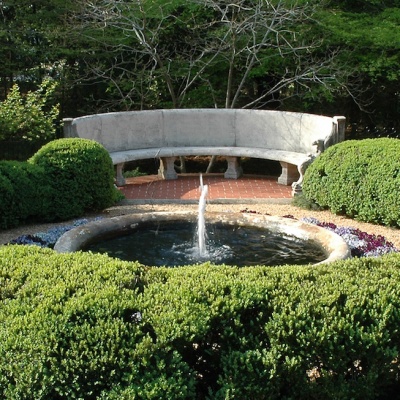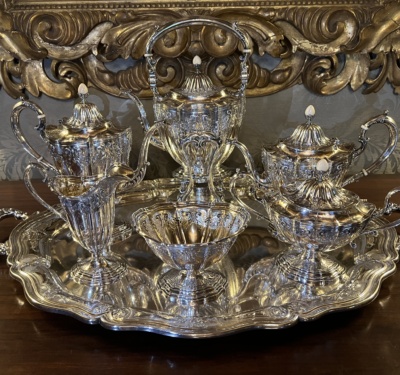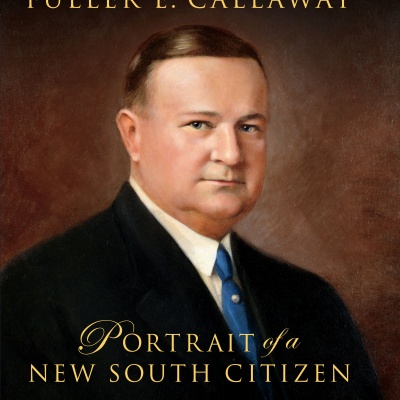The First Citizen of LaGrange
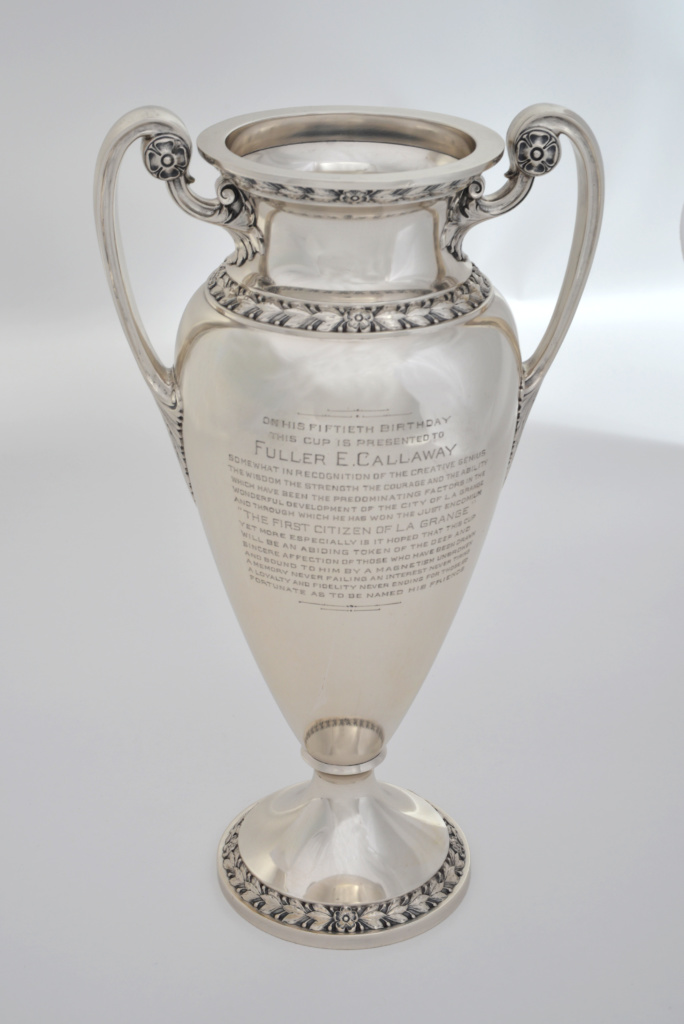
One hundred years ago, in the spring of 1920, an engraver at Gorham Silver was busy carefully inscribing a sterling silver loving cup. It had been ordered by a group of citizens from LaGrange, Georgia. Only upon close inspection does one notice the beautiful craftsmanship. The loving cup was created as a special gift for Fuller E. Callaway’s 50th birthday but it was more than that. On one side the initials FEC are creatively set within a circular design, while the other side reveals a touching tribute honoring Mr. Callaway, prescribing him as: THE FIRST CITIZEN OF LAGRANGE. The highest honor ever given to a member of the community. How did Mr. Callaway become so admired and respected that his friends and associates would bestow this beautiful gift and high honor upon him? What characteristics made the man so special? What values did he hold dear and how did he accomplish so much in a relatively short life of fifty-seven years?
As you might imagine, he left no answers to these specific questions himself, but because of his acclaim, magazine features and historical literature are sprinkled with stories and anecdotes. We also have remembrances from his two sons, Cason and Fuller Jr, and other family members and friends. With these in hand, we gleaned a good bit and then narrowed it down to eight key characteristics that helped make him successful. We hope you enjoy getting to know Mr. Callaway better and you might even find them relevant in your life.
Cooperation – It’s no surprise that Mr. Callaway’s first textile mill, founded in 1900, was called “Unity” and was financed by a group of mostly local investors. As he expanded his businesses, employees were provided a variety of benefits, including profit sharing. When a British friend asked him about the success of his LaGrange enterprises Fuller responded: “The basic idea behind everything we do is cooperation – a recognition of the fact that the ideal relationship is one in which capital, management, labor, and customers all receive fair treatment.” So strong was his belief in working together that employees were sometimes called “co-operatives.”
Family & Friendship – While their relationships were at times somewhat businesslike, Mr. Callaway was most proud of his wife and two sons. They were the center of his life. He treasured his entire family, and numerous members of their extended family lived with Fuller and Ida over the years. He took his older brother Pope, who was facing some life struggles, under his wing, and he lived with the couple for almost 20 years. Stories abound of Mr. Callaway making friends and then inviting them to his home for lunch or dinner. It has been said Ida never knew how many people might be coming for the next meal! In 1919, Callaway was dispatched to Europe on behalf of the American Cotton Manufacturers Association to persuade textile men to attend the World Cotton Conference being held in New Orleans that fall. This was no small task given the state of European economy in the wake of WWI. Not surprisingly, because of his gregarious personality, the journey was a great success, with hundreds of attendees making the trans-Atlantic trip.
Generosity – A central tenet of Mr. Callaway’s life was generosity. This was probably inspired by his faith but was also linked to his business interests although he eschewed the term “philanthropist.” The Callaway enterprises built houses, churches, hospitals, schools, greenhouses, and other amenities to make LaGrange a better place to live. He felt these benefits would help him keep good employees as they would be happier in the community. A small but fun gesture he loved was at Christmas time when he played Santa Claus by stuffing his pockets with dollar bills and passing them out to children in town. This interest in humanity endeared him to the community. He always said: “Your best investment is folks. Pays the biggest dividends, too: that warm feeling when you see some boy climbing or some man stepping out in front.”
Love Your Work and Work Hard – One of the main reasons for Mr. Callaway’s success was that he liked what he was doing better than anything else in the world. Upon finding what you love to do, he then advocated working hard at it. During his career, he was known for putting in 12 to 16 hour days. In 1904, he testified in Washington against the proposed eight-hour day for mill employees, as he believed that the willingness to work hard was one of the key advantages the southern states had to make them competitive in the national market. In his mind, there was simply no substitute for it. He did say, however, that older workers should reduce their hours and pass the active labor on to youngsters with the experienced folks providing wisdom and guidance.
Loyalty – On several occasions, Mr. Callaway had business and professional opportunities farther afield, but he decided to forego those prospects and stay in LaGrange. Fuller Callaway Sr standing near steps in Ferrell Garden c. 1916. He was such an admired salesman that in 1895 a group of Atlanta businessmen offered him the princely sum of $25,000 to move to Atlanta and run their company. But he turned them down and stayed in LaGrange! Speaking at a labor-employer conference in Washington D.C. in 1919, he said; “I was born in LaGrange, and I live there yet, and I expect to die there, and I do not think that is anything against me; and if you can stabilize people to stay in one place and build up character and friends and reputation, it looks to me like a very good thing.”
Practical Education – Fuller highly valued what he called a “practical education” because he felt it made people more reasonable, a better citizen and person, and a better worker. Despite never attending college, he did adopt a habit of reading and studying every day and famously said: “The only man I am afraid of is the ignorant man. Educate a man and you can reason with him. I don’t want people who cannot think in any undertaking of mine. I am afraid of them. I am never afraid of a man who can think.” He admired teachers and said: “I do not know anybody that is of more use in this community than the teachers…”
Thrift – Thrift is not a word you commonly hear today, but this is a trait Mr. Callaway greatly valued and one he exercised daily. When ordering supplies for his new home he almost always asked for a 10% trade discount and price shopped so he would get the best product for the most reasonable price. He always said he lived on “Cash Street” until he saved enough money to live on “Mortgage Avenue” and he would borrow money only as an absolute last resort. He was adamant about sticking to a budget and a stickler for managing money well. Once when his wife Ida overspent the weekly allowance they both agreed it would be paid back by reducing future allocations. He thought prudent financial management was essential for success.
Perseverance – Lastly, Mr. Callaway believed in perseverance and diligence. As he said: “It never pays to hurry on the road to success. What we need is patience and constancy. We’ve got a chinaberry tree here in the South that grows into a good sized tree in ten years. But it dies in ten or more. The oaks take fifty to a hundred years to grow, and they last longer than that. Don’t be a chinaberry if you want a long career.”
The loving cup reads:
ON HIS FIFTIETH BIRTHDAY
THIS CUP IS PRESENTED TO
FULLER E. CALLAWAY
SOMEWHAT IN RECOGNITION OF THE CREATIVE GENIUS
THE WISDOM THE STRENGTH THE COURAGE AND THE AGILITY
WHICH HAVE THE PREDOMINATING FACTORS IN THE
WONDERFUL DEVELOPMENT OF THE CITY OF LA GRANGE
AND THROUGH WHICH HE HAS WON THE JUST ENCOMIUM
THE FIRST CITIZEN OF LA GRANGE
AND MORE ESPECIALLY IS IT HOPED THAT THIS CUP
WILL BE AN ABIDING TOKEN OF THE DEEP AND
SINCERE AFFECTION OF THOSE WHO HAVE BEEN DRAWN
AND BOUND TO HIM BY A MAGNETISM UNBROKEN
A MEMORY NEVER FAILING; AN INTEREST NEVER TIRING
A LOYALTY AND FIDELITY NEVER ENDING FOR THOSE SO
FORTUNATE AS TO BE NAMED HIS FRIENDS
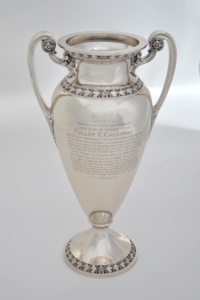
The sterling silver loving cup given to Fuller Callaway on his 50th birthday, and honoring him as “The First Citizen of LaGrange.” |
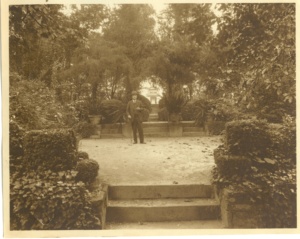
Fuller Callaway Sr standing near steps in Ferrell Garden c. 1916. |
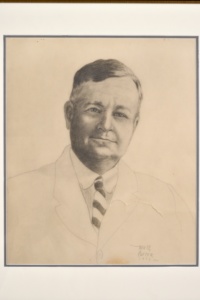
Pencil sketch of Fuller Callaway Sr by Vance Lovejoy Cotter c. 1924. |
View this entire Portico Newsletter:
